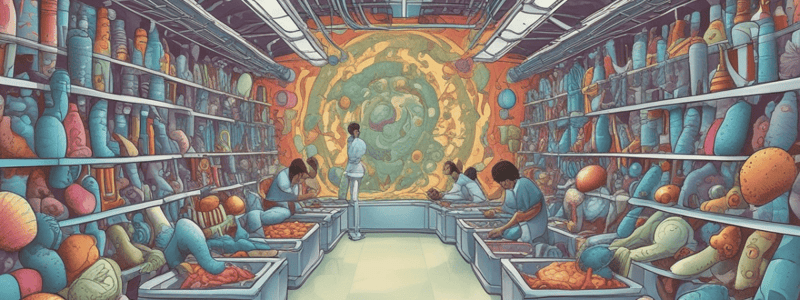Podcast
Questions and Answers
Which one of the following organisms is least likely to cause non-bloody diarrhea for the past 14 hours?
Which one of the following organisms is least likely to cause non-bloody diarrhea for the past 14 hours?
- Shigella dysenteriae
- Streptococcus pyogens (correct)
- Clostridium difficile
- Salmonella enteritidis
The class of an immunoglobulin is determined by:
The class of an immunoglobulin is determined by:
- Class 1 and Class 11 major histocompatibility complex proteins
- the carbohydrate attached to the light chain
- the antigen
- the heavy chain type (correct)
- the J-chain
- none of the above
Immunological memory is predominantly the function of which of the following?
Immunological memory is predominantly the function of which of the following?
- cells bearing pattern-recognition receptor molecules
- molecules comprising the chemical barrier
- the complement system
- cells of the adaptive immune system (correct)
All of the following are true with respect to IgM antibodies EXCEPT which one?
All of the following are true with respect to IgM antibodies EXCEPT which one?
The cells of the adaptive immune system are T- and B-cell lymphocytes. Both are:
The cells of the adaptive immune system are T- and B-cell lymphocytes. Both are:
Which technique is used to isolate a single type of microorganism from a mixed culture?
Which technique is used to isolate a single type of microorganism from a mixed culture?
Which of the following is NOT made using a pure culture?
Which of the following is NOT made using a pure culture?
What is the primary purpose of using a pure culture in microbial experiments?
What is the primary purpose of using a pure culture in microbial experiments?
Flashcards are hidden until you start studying
Study Notes
Diarrhea Causes
- A 30-year-old woman with non-bloody diarrhea for 14 hours is unlikely to be caused by Streptococcus pyogens.
- Clostridium difficile, Shigella dysenteriae, and Salmonella enteritidis are more likely causes of diarrhea.
Microbiology Techniques
- Pure culture: a culture that contains only one type of microorganism, important for studying the characteristics of a specific microbe.
- Spread plates: a type of plate used to isolate and count microorganisms, prepared by spreading a small volume of culture onto the surface of the plate.
- Streak plates: a type of plate used to isolate microorganisms, prepared by streaking a small volume of culture onto the surface of the plate in a specific pattern.
- Pour plates: a type of plate used to count microorganisms, prepared by pouring a small volume of culture into a molten agar medium.
Immunology
- The class of an immunoglobulin is determined by the heavy chain type.
- Immunological memory is predominantly the function of cells of the adaptive immune system.
- IgM antibodies:
- fix complement
- occur on the surface of lymphocytes
- predominate in the primary response to antigen
- are glycoproteins
- do not mediate allergic reactions
- T- and B-cell lymphocytes are antigen-specific, long-lived cells with "memory" for the antigen.
Studying That Suits You
Use AI to generate personalized quizzes and flashcards to suit your learning preferences.




